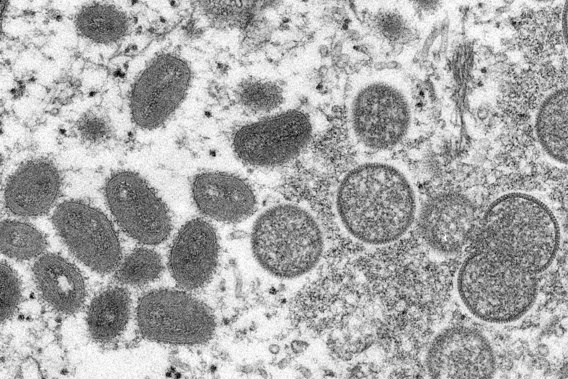
The deadly monkeypox virus has spread in Australia for the first time, with two people feared to have caught the tropical disease through local transmission.
People in New South Wales have been warned to keep an eye out for symptoms of monkeypox after 11 cases of the virus were confirmed in the state on Tuesday.
Two of the cases are believed to have been acquired in Australia - the first to be locally transmitted here. The other nine cases are believed to have originated overseas.
"People need to be aware of the symptoms of monkeypox, which can include fever, headache, body aches and a rash or lesions on the genital area," NSW Health executive director of health protection Dr Jeremy McAnulty said.
"So far, in the cases, we have seen in NSW, monkeypox is not presenting the way some people expect, such as an extensive rash or lesions all over the body.
/cloudfront-ap-southeast-2.images.arcpublishing.com/nzme/EOAL5WM6NXL6BNB66YAD3ABAMA.jpg) Symptoms of one of the first known cases of the monkeypox virus are shown on a patient. (Photo / Getty)
Symptoms of one of the first known cases of the monkeypox virus are shown on a patient. (Photo / Getty)
"It could just be a couple of what seem to be pimples in the genital area or buttocks, so people need to pay careful attention to any potential symptoms. Most of our cases to date have presented to sexual health clinics, rather than GPs."
Dr McAnulty said people who have any of these symptoms should immediately call ahead to their GP or sexual health service for an appointment, tell them of their symptoms and make sure they wear a mask as a precaution.
"The virus is mainly spread through skin-to-skin contact with the lesions or rarely through close contact with large respiratory droplets from a person early on in their infection," Dr McAnulty said.
"It is important that people with symptoms avoid close contact with others, including sexual activity, as condoms are not effective at preventing the transmission of monkeypox."
Australia's first monkeypox case was recorded on May 20 and there have been four other cases in Victoria and one in South Australia.
Another person had the disease in Western Australia, but had already flown to the UK from Perth by the time they were diagnosed.
Monkeypox symptoms include fever, muscle aches, swollen lymph nodes, chills, exhaustion and a chickenpox-like rash on the hands and face.
No treatment exists, but the symptoms usually clear up after two to four weeks. The disease is considered endemic in 11 African nations, where the death rate is between three and six per cent.
The World Health Organisation recently confirmed that 5322 laboratory-tested cases of monkeypox had been reported to it in the current outbreak, 85 per cent of which are in Europe.
Though case numbers are rapidly increasing, the United Nations health agency has not set a date for its emergency committee on monkeypox to convene for a second meeting.
"From January 1 to June 30 this year, we have 5322 laboratory-confirmed cases and one death," WHO spokeswoman Fadela Chaib told reporters in Geneva.
The number has increased by 56 per cent in eight days. The previous figure given by the WHO, for the period up to June 22, was 3413 cases.
/cloudfront-ap-southeast-2.images.arcpublishing.com/nzme/WG76RO6EST462V3ZPKYGCOBYLQ.jpg) Monkeypox-like lesions are shown on the arm and leg of a female child in Bondua, Liberia. (Photo / Getty)
Monkeypox-like lesions are shown on the arm and leg of a female child in Bondua, Liberia. (Photo / Getty)
A surge in monkeypox cases has been reported since early May outside the West and Central African countries where the disease has long been endemic.
Chaib said infections had now been reported in 53 countries. "Eighty-five per cent of cases are in Europe, followed by the African region, the Americas, the Eastern Mediterranean and the Pacific," she said.
"The WHO continues to ask countries to pay particular attention to monkeypox cases to try to stop further infections." Most monkeypox infections so far have been observed in men who have sex with men, of young age and chiefly in urban areas, according to the WHO.
On June 23, the UN health agency convened an emergency committee of experts to decide if monkeypox constitutes a so-called Public Health Emergency of International Concern (PHEIC) - the highest alarm that the WHO can sound.
But a majority found the situation had not yet crossed that threshold. However, they acknowledged the emergency nature of the outbreak and said controlling its further spread required intense response efforts.
The committee can reconvene at any time, depending on the changing situation. The WHO's 16-member emergency committee on monkeypox is chaired by Jean-Marie Okwo-Bele from the Democratic Republic of Congo, who is a former director of the WHO's Vaccines and Immunisation Department.
Take your Radio, Podcasts and Music with you









